Third Sunday in Ordinary
Time
January 26, 2014, Cycle A
Green priestly vestments symbolize hope and the vitality of
the life of faith.
Home Page
Liturgical
Year Cycle A 13-14
Introductory Acts Of Worship
The Entrance Prayers:
On Sunday, usually a hymn praising God
is sung in place of reciting a Psalm from the Bible which invites us to
enter more deeply into the mystery of God's love for us. The recited
weekday Psalm expresses a youthful heart and spirit, delighted that we may come
before the living God.
Entrance Song
/ Entrance Psalm (Antiphon)
Entrance Song
Psalm 95:1,6 O
sing a new song to the
Lord! Sing to the Lord, all the earth. In his presence are majesty
and splendor, strength and honor in his holy place.
The Priest Approaches and Kisses the Altar:
The
altar is a symbol of Christ. In it are cut five crosses to recall the five
wounds of Christ. The altar also represents the Church and has embedded in
it the relics of her saints. The priest comes to the altar to celebrate
the Sacrifice in the Church's name. Because of the glory surrounding the
altar upon which the divine Sacrifice will be made, the kiss of the priest
unites the Church to Christ, its Redeemer.
Priest:
In the name of the Father, and of the Son, and of the Holy Spirit.
All:
Amen.
The Greeting:
We are welcomed in God's name. Our
response unites us to our neighbor, to the priest and to God. (The priest
may select from several forms of greeting).
Priest: The Lord be with you.
All: And
with your spirit.
The Penitential Prayers:
We recognize our guilt for past sins,
express our sorrow for them, and ask that Mary, the angels, the saints, and our
brothers and sisters in Christ pray for the Lord God's mercy. (The priest
may select from several forms).
Priest: Brothers and sisters, let
us acknowledge our sins, and so prepare ourselves to celebrate the sacred
mysteries.
Priest: You were sent to heal the contrite of heart: Lord, have
mercy.
All: Lord, have mercy.
Priest: You came to call sinners: Christ, have mercy.
All: Christ, have mercy.
Priest: You are seated at the right hand of the Father to intercede
for us: Lord, have mercy.
All: Lord, have mercy.
The Absolution:
Priest: May almighty God have
mercy on us, forgive us our sins, and bring us to everlasting life.
All:
Amen.
The Gloria:
The Glory of God prayers have existed from
the second century. They repeat the angels praise of God which heralded
the birth of Christ on earth. Our praise is lifted again through the years
as we rejoice at His coming as Lord, God, the most high Jesus Christ, who at
Christmas took on our human nature while at the same time being the son of Man.
This ancient hymn expresses our recognition of God's glory and love. It
calls upon Christ as our holy and divine mediator, and the Holy Spirit who
forever binds us together in God's love.
Priest and All:
Glory to God in the highest, and peace to his people
on earth. Lord God, heavenly King, almighty God and Father, we worship
you, we give you thinks, we praise you for your glory. Lord Jesus Christ,
only son of the Father, Lord God, Lamb of God, you take away the sins of the
world: have mercy on us; you are seated at the right hand of the Father: receive
our prayer. For you alone are the Holy One, you alone are the Lord, you
alone are the Most High, Jesus Christ, with the Holy Spirit, in the glory of God
the Father. Amen.
The Collect:
The
priest lifts the united prayers and petitions of the congregation to God the
Father through the merits of Jesus Christ in the Holy Spirit.
Priest: Let us pray.
Priest: All-mighty ever-living God, direct
our actions according to your good pleasure, that in the name of your beloved
Son we may abound in good works. Through our Lord Jesus Christ, your son,
who lives and reigns with you in the unity of the Holy Spirit, one God, for ever
and ever.
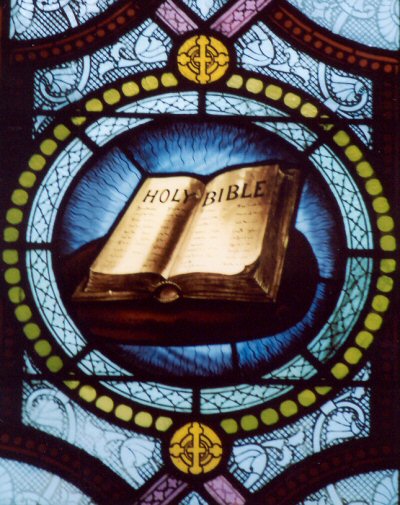 Liturgy
of the Word
Liturgy
of the Word
Christ is made known to us through the
Old Testament which prepares us to recognize Him. In those days, God
inspired men who spoke His message. Now, the New Testament Gospel reading
announces His presence to us directly through His Son. Both
readings bring God's message to us. Our responsibility is to respond.
The First Reading:
From the Old Testament
Priest/Reader: A
reading from the prophet Isaiah.
First Reading: Isaiah 8:23-9:3
First the Lord degraded the land of Zebulun and the land of Naphtali; but in
the end he has glorified the seaward road, the land west of the Jordan, the
District of the Gentiles.
Anguish has taken wing, dispelled is
darkness: for there is no gloom where but now there was distress.
The people who walked in
darkness have seen a great light; upon those who dwelt in the land of gloom a
light has shone. You have brought them abundant joy and great rejoicing. As
they rejoice before you as at the harvest, as people make merry when dividing
spoils. For the yoke that burdened them, the pole on their shoulder, and the
rod of their taskmaster you have smashed, as on the day of Midian.
Priest/Reader:
The Word of the
Lord.
All:
Thanks
be to God.
The Responsorial Psalm:
This Psalm praising God, is a prayer to God,
or recommends the practice of virtue. It is sung as an interlude between
the scriptural readings. It provides yet another instructional setting and
invites the assembly to imitate the cantor who sings a repeated response to the
verses of an ancient Psalm many of which are attributed to King David. The
verses are sung first by a cantor (song leader) accompanied by instruments, the
refrain is sung by the people.
Psalm 128:1-2, 3, 4-5
Cantor: The Lord is my light and
my salvation.
All:
The Lord is my light and my salvation.
Cantor: The Lord is my light and my salvation; whom should I
fear? The Lord is my life's refuge; of whom should I be afraid?
All:
The Lord is my light and my salvation.
Cantor: One thing I ask of the Lord; this I seek: To dwell in
the house of the Lord all the days of my life, that I may gaze on the loveliness
of the Lord and contemplate his temple.
All:
The Lord is my light and my salvation.
Cantor: I believe that I shall see the bounty of the Lord in the
land of the living. Wait for the Lord with courage; be stouthearted, and
wait for the Lord.
All:
The Lord is my light and my salvation.
Second Reading
Priest/Reader: A Reading
from the second Letter of Saint Paul to the Corinthians.
Second Reading: 1 Corinthians 1:10-13, 17
I urge you, brothers and sisters, in the
name of our Lord Jesus Christ, that al of you agree in what you say, and that
there be no divisions among you, but that you be united in the same mind and in
the same purpose. For it has been reported to me about you, my brothers and
sisters, by Chloe’s people, that there are rivalries among you. I mean that
each of you is saying, “I belong to Paul,” or “I belong to Apollos,” or “I
belong to Cephas,” or “I belong to Christ.” Is Christ divided? Was Paul
crucified for you? Or were you baptized in the name of Paul? For Christ did
not send me to baptize but to preach the gospel, and not with the wisdom of
human eloquence, so that the cross of Christ might not be emptied of its
meaning.
The Alleluia:
An ancient expression of joy anticipating
the Lord's message we will hear in the Gospel.
Matthew 4:23
Cantor: Alleluia! Alleluia!
Alleluia!
All: R/. Alleluia! Alleluia!
Alleluia!
Cantor: Jesus proclaimed the gospel of the kingdom and
cured every disease among the people.
All: R/. Alleluia! Alleluia!
Alleluia!
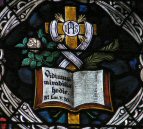 The Gospel:
The Liturgy of the Word is completed
by the reading of the Gospel. Before its reading, the members of the
assembly trace the sign of the cross upon the forehead to indicate their mental
acceptance of the Truth, on the lips to indicate their readiness to announce it,
and over the heart to indicate their sincere desire to accept it into their
lives. The "Good News" of the Gospel tells that God's kingdom has come for
all to hear, accept, and announce to the world for its salvation. It
is God who is speaking to us. Christ comes to teach us by the example of
His life and by His own words.
The Gospel:
The Liturgy of the Word is completed
by the reading of the Gospel. Before its reading, the members of the
assembly trace the sign of the cross upon the forehead to indicate their mental
acceptance of the Truth, on the lips to indicate their readiness to announce it,
and over the heart to indicate their sincere desire to accept it into their
lives. The "Good News" of the Gospel tells that God's kingdom has come for
all to hear, accept, and announce to the world for its salvation. It
is God who is speaking to us. Christ comes to teach us by the example of
His life and by His own words.
Priest: Cleanse my heart and my lips, almighty God, that I may worthily proclaim your
holy Gospel. Through the words of the Gospel may our sins be wiped away.
Priest: The Lord be with you.
All: And
also with you.
Priest/Deacon: A
reading from the holy Gospel according
to Matthew.
All: Glory
to you, Lord.
The Gospel: Matthew 4:12-23
Matthew wrote to show that Christ
was the
Messiah and fulfilled the Jewish prophecies
 When
Jesus heard that John had been arrested, he withdrew to Galilee. He left
Nazareth and went to live in Capernaum by the sea, in the region of Zebulun and
Naphtali, that what had been said through Isaiah the prophet might be
fulfilled: Land of Zebulun and land of Naphtali, the way to the sea, beyond
the Jordan, Galilee of the Gentiles, the people who sit in darkness have seen a
great light, on those dwelling in a land overshadowed by death light has arisen.
When
Jesus heard that John had been arrested, he withdrew to Galilee. He left
Nazareth and went to live in Capernaum by the sea, in the region of Zebulun and
Naphtali, that what had been said through Isaiah the prophet might be
fulfilled: Land of Zebulun and land of Naphtali, the way to the sea, beyond
the Jordan, Galilee of the Gentiles, the people who sit in darkness have seen a
great light, on those dwelling in a land overshadowed by death light has arisen.
From that time on, Jesus began to preach
and say, “Repent, for the kingdom of heaven is at hand.”
As he was walking by the
Sea of Galilee, he saw two brothers, Simon who is called Peter, and his brother
Andrew, casting a net into the sea; they were fishermen. He said to them, “Come
after me, and I will make you fishers of men.” At once they left their nets and
followed him. He walked along from there and saw two other brothers, James, the
son of Zebedee, and his brother John. They were in a boat, with their father
Zebedee, mending their nets. He called them, and immediately they left their
boat and their father and followed him. He went around all of Galilee, teaching
in their synagogues, proclaiming the gospel of the kingdom, and curing every
disease and illness among the people.
Priest: The
Gospel of the Lord.
All: Praise to you, Lord Jesus Christ.
The Priest's Sermon:
The priest develops, explains, and comments upon the Master's words,
so our minds may be
enlightened, and our
hearts enriched.
(A priestly reflection upon this Gospel)
Profession of Faith:
We state in the
Nicene Creed the principles of our faith in precise and definite terms.
All: I believe in one God, the Father, the Almighty,
maker of heaven and earth, of all that is seen and unseen. I believe in
one Lord, Jesus Christ, the Only Begotten Son of God, born of the Father before
all ages.
God from God, Light from Light, true God from true God, begotten, not made,
consubstantial with the Father; through him all things were made. For us
men and for our salvation he came down from heaven, and by the Holy
Spirit was incarnate of the Virgin Mary, and became man. For our sake he was
crucified under Pontius Pilate, he suffered death and was buried, and rose again
on the third day in accordance with the Scriptures. He ascended into
heaven and is seated at the right hand of the Father. He will come again
in glory to judge the living and the dead and his kingdom will have no end.
I believe in the Holy Spirit, the Lord, the giver of life, who proceeds from
the Father and the Son, who with the Father and the Son is adored and
glorified, who has spoken through the prophets. I believe in one,
holy, catholic and apostolic Church. I confess one Baptism for the
forgiveness of sins and I look for the resurrection of the dead and the
life of the world to come. Amen.
General Intercessions:
We pray for the needs of the pope, civic
leaders, our own needs, those of others,
the sick, the dying, those who have died, the church, and the world.
The response of all to each intercession: Lord, hear our prayer.
All: Lord,
hear our prayer.
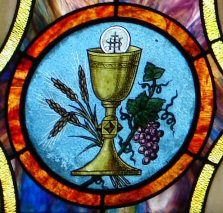 The Liturgy of the Eucharist
The Liturgy of the Eucharist
Gifts of bread and wine
symbolizing ourselves are presented to the priest who will offer them to God the
Father. Through the Holy Spirit, they will become the Body and Blood of
Jesus Christ whom we receive in Holy Communion. Jesus unites Himself with
us for our spiritual nourishment and strength. Today, when individuals do
not present their own personal offerings of bread and wine, the monetary contribution
symbolizes the material of their united sacrifice. The priest makes and
offering of the bread and wine to God.
Preparation of the Bread and
Wine:
Priest: Blessed are you, Lord God of all creation,
for through your goodness we have received the bread we offer you:
fruit of the earth and work of human hands, it will become for us the bread of
life.
All:
Blessed be God for ever.
Priest: By
the mystery of this water and wine may we come to share in the divinity of
Christ, who humbled himself to
share
in our humanity.
Priest: Blessed are you, Lord God of all creation, for through your goodness we have
received the wine we offer you; fruit
of the vine and work of human hands it will become our spiritual drink.
All: Blessed be God for ever.
Priest: With
humble spirit and contrite heart may we be accepted by you, O Lord, and may our
sacrifice in your sight this
day be pleasing to you, Lord God.
The Priest's Hands are Washed: This
act was traditionally necessary because the priest handled the various gifts
presented by the people. Now, the cleansing act using water reminds the
priest and ourselves of the need to cleanse not only the hands but the soul.
Soon, the priest's hands will hold the actual body of Christ, and we will become
His dwelling place.
Priest: Wash
me O Lord, from my iniquity and cleanse me from my sin.
Pray, brethren, that
my sacrifice and yours may be acceptable to God, the almighty Father.
All: May the Lord accept the sacrifice at your hands for the praise and glory of his
name, for our good and the good of
all his holy Church.
Prayer over the Gifts:
Speaking in our name, the priest asks
the Father to accept the gifts we offer through him.
Priest: Accept
our offerings, O Lord, we pray, and in sanctifying them grant that they may
profit us for salvation. Through Christ our Lord.
Eucharistic Prayer:
(Number Three: The priest may select from several forms).
Priest: The Lord be with you.
All: And with your
spirit.
Priest: Lift up your hearts.
All: We lift them up to the Lord.
Priest: Let us give thanks to the Lord, our God.
All: It is right
and just.
Preface Prayer:
It is truly right and just, our duty and our
salvation, always and everywhere to give you thanks, Lord, holy Father, almighty
and eternal God, through Christ our Lord. For out of compassion for the
waywardness that is ours, he humbled himself and was born of the Virgin; by the
passion of the Cross he freed us from unending death, and by rising from the
dead he gave us life eternal. And so, with Angels and Archangels, with
Thrones and Dominions, and with all the hosts and Powers of heaven, we sing the
hymn of your glory, as with out end we acclaim:
Acclamation:
Priest
and All:
Holy, Holy, Holy Lord, God of hosts. Heaven and
earth are full of your glory. Hosanna in the highest.
Blessed
is he who comes
in the name of the Lord. Hosanna in the highest.
Priest: You are indeed Holy, O Lord, and all you have
created rightly gives you praise, for through your Son our Lord Jesus Christ, by
the power and working of the Holy Spirit, you give life to all things and make
them holy, and you never cease to gather a people to yourself, so that from the
rising of the sun to its setting a pure sacrifice may be offered to your name.
Priest: Therefore, O Lord, we humbly implore you: by the same
Spirit graciously make holy these gifts we have brought to you for consecration,
that they may become the Body and Blood of your Son our Lord Jesus Christ, at
whose command we celebrate these mysteries.
The priest repeats
the words which Christ used at his Last Supper when He changed the bread into
His Body and the wine into His Blood. His Body and Blood are truly present
but under the appearance of bread and wine. The death of Christ is
prolonged in each of those who receive Him worthily. We apply His death to
ourselves so that we may share His glory. This moment is the most solemn
on earth because it is Divine act which enables us to apply to ourselves the
Cross which Christ willingly took upon Himself.
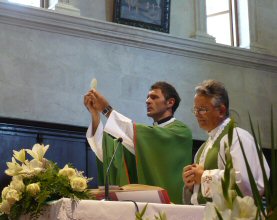 We are called to die to sin and
lift our very selves to God so that we become changed; to do as God would have
us do, to become what God would have us become. Our own little cross can
lift us into union with Christ's Cross so we may earn the joys of everlasting
happiness with God the Father.
We are called to die to sin and
lift our very selves to God so that we become changed; to do as God would have
us do, to become what God would have us become. Our own little cross can
lift us into union with Christ's Cross so we may earn the joys of everlasting
happiness with God the Father.
The
Lord's Supper:
At the time he was betrayed and entered
willingly into his Passion, he took bread and, giving thanks, broke it, and gave
it to his disciples, saying:
Take this, all of you, and eat of it, for this is my Body, which will be given
up for you.
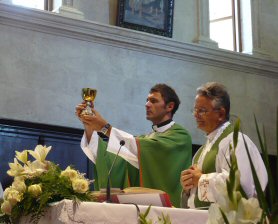 In
a similar way, when supper was ended, he took the chalice and, once more giving
thanks, he gave it to his disciples, saying:
In
a similar way, when supper was ended, he took the chalice and, once more giving
thanks, he gave it to his disciples, saying:
Take this, all of you, and
drink from it, for this is the chalice of my Blood, the Blood of the new and
eternal covenant, which will be poured out for you and for many for the
forgiveness of sins. Do this in memory of me.
Memorial Acclamation: (The priest may
select from several forms).
Priest: The
mystery of faith.
Priest
/ All: Save us,
Savior of the world, for by your Cross and Resurrection you have set us free.
Memorial Prayer: (The
priest may select from several forms).
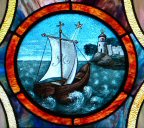 Priest:
Priest:
Recalls Christ's Passion, Resurrection, Ascension, the Church,
the dead, and ourselves.
Therefore, O Lord, as we celebrate the memorial of the saving Passion of
your Son, his wondrous Resurrection and Ascension into heaven, and as we look
forward to his second coming, we offer you in thanksgiving this holy and living
sacrifice. Look, we pray, upon the oblation of your Church and,
recognizing the sacrificial Victim by whose death you willed to reconcile us to
yourself, grant that we, who are nourished by the Body and Blood of your Son and
filled with his Holy Spirit, may become one body, one spirit in Christ.
May he make of us an eternal offering to you,
so that we may obtain an inheritance with your elect, especially with the most
Blessed Virgin Mary, Mother of God, with blessed Joseph, her Spouse, with your blessed Apostles and glorious
Martyrs and with all the Saints, on whose constant intercession in your presence
we rely for unfailing help.
May this Sacrifice of our reconciliation, we
pray, O Lord, advance the peace and salvation of all the world. Be pleased
to confirm in faith and charity your pilgrim Church on earth, with your servant,
_____ our Pope and, _____ our Bishop, the Order of Bishops, all the clergy, and
the entire people you have gained for your own. Listen graciously to the
prayers of this family, whom you have summoned before you: in your compassion, O
merciful Father, gather to yourself all your children scattered throughout the
world.
To our departed brothers and sisters and to all who were pleasing to you at
their passing from this life, give kind admittance
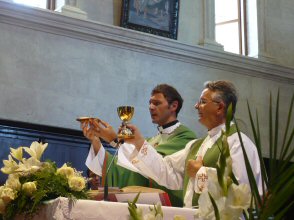 to
your kingdom. There we hope to enjoy for ever the fullness of your glory
through Christ our Lord, through whom you bestow on the world all that is good.
to
your kingdom. There we hope to enjoy for ever the fullness of your glory
through Christ our Lord, through whom you bestow on the world all that is good.
Doxology
Prayer of Praise:
Through
him, with him, and in him, O God, almighty Father, in the unity of the Holy
Spirit, all glory and honor is yours, for ever and ever.
All: Amen.
Communion Rite
In the Liturgy of the Eucharist, we
symbolically offer ourselves to the Lord through the gifts of bread and wine.
At the Consecration, we offer our very lives to be united the God the Father
through the Cross of Christ. In Communion, we find that we have not died
at all, but have come to life. We have surrendered ourselves to God
through His Divine Son, Jesus Christ. In return become ennobled and
enriched. We give up time and we get eternity, we give up our sin and we
receive grace, we surrender our self-will and receive the strength of the Divine
Will, we give up ourselves and we receive everything. For the Son of God
says to us that unless we receive Him we shall not have Divine life in us.
But it is not really we who receive Christ as it is Christ who receives us,
bringing us into Himself.
God makes His Cross the very means
of our salvation and our life. While we have crucified Him, His eternal
love cannot be extinguished. Christ willed to give us the very life we
crucified in our Redemption, the Consecration of Holy Thursday into Communion,
His death into our everlasting life.
The Lord's Prayer:
Priest: At
the Savior's command and formed by divine teaching, we dare to say:
Priest and
All: Our
Father, who art in heaven, hallowed be they name; Thy kingdom come; Thy will be
done on earth as it is in
heaven. Give us this
day our daily bread, and forgive us our trespasses, as we forgive those who
trespass against us; and lead us not into temptation, but deliver us from evil.
Priest: Deliver us, Lord, we pray, from every evil, graciously
grant peace in our days, that, by the help of your mercy, we may be always free
from sin and safe from all distress, as we await the blessed hope and the coming
of our Savior, Jesus Christ.
All: For the
kingdom, the power and the glory are yours now and forever.
Prayer for
Peace:
Priest: Lord Jesus Christ, who said to your Apostles: Peace I leave
you, my peace I give you, look not on our sins, but on the faith of your Church,
and graciously grant her peace and unity in accordance with your will. Who
live and reign for ever and ever.
All: Amen.
Priest: The peace of the Lord be with
you always.
All: And with your spirit.
Priest: Let us offer each other the sign of peace.
Breaking of the Bread:
Priest: May this mingling of the Body and Blood of our Lord
Jesus Christ bring eternal life to us who receive it.
Priest and All: Lamb of God, you take away the sins of the world,
have mercy on us.
Lamb of God, you take away the sins of the world, have mercy on us.
Lamb of God, you take away the sins of the world, grant us peace.
Priestly Preparation: May the receiving of your Body
and Blood, Lord Jesus Christ, not bring me to judgment and condemnation, but
through your loving mercy be for me protection in mind and body and a healing
remedy.
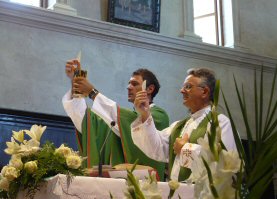 Priest: Behold
the Lamb of God, behold him who takes away the sins of the world. Blessed
are those called to the supper of the Lamb.
Priest: Behold
the Lamb of God, behold him who takes away the sins of the world. Blessed
are those called to the supper of the Lamb.
Priest and All: Lord,
I am not worthy that you should enter under my roof, but only say the world and
my soul shall be healed.
Priest: May the Body of Christ keep me safe for eternal life.
May the Blood of Christ keep me safe for eternal life.
Communion Antiphon:
Psalm 34:6
Look toward the Lord and
be radiant; let your faces not be abashed.
Communion of the Faithful:
Priest:
The Body of Christ.
The Faithful: Amen.
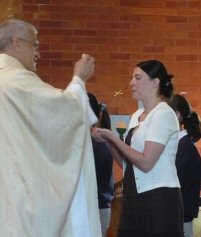
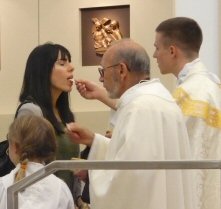
Priest/Deacon/
Extraordinary Eucharistic Minister:
The Blood of Christ.
The Faithful: Amen.
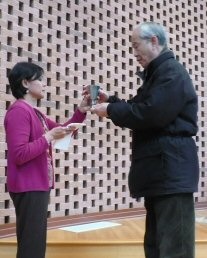
Cleansing of the Vessels:
Priest: What has passed our lips as food, O Lord, may we
possess in purity of heart, that what has been given to us in time may be our
healing for eternity.
Prayer after Communion:
Priest: Let us pray.
Priest: Grant, we pray, almighty God, that, receiving the grace by
which you bring us to new life, we may always glory in your gift. Through
Christ our Lord.
Concluding Rite
Greeting:
Priest: The Lord be with you.
All: And
with your spirit.
Priest: Bow
down for the blessing.
Blessing:
Priest: May the peace of God, which surpasses all understanding,
keep your hearts and minds in the knowledge and love of God, and of his Son, our
Lord Jesus Christ.
All: Amen.
Priest: And may the blessing of almighty God, the Father, and the Son,
and the Holy Spirit, come down on you and remain with you for ever.
All: Amen.
Priest: Go in peace.
All: Thanks be to God.
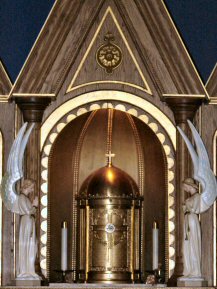 O my Jesus, forgive us our sins.
O my Jesus, forgive us our sins.
Save us from the fires of hell.
Lead all souls to heaven,
especially those in most need of your mercy.
www.Divinemasterplanforlife.com
www.Saintsnheaven.com
Top
Home Page
Liturgical
Year Cycle A 13-14
 Liturgy
of the Word
Liturgy
of the Word The Gospel:
The Liturgy of the Word is completed
by the reading of the Gospel. Before its reading, the members of the
assembly trace the sign of the cross upon the forehead to indicate their mental
acceptance of the Truth, on the lips to indicate their readiness to announce it,
and over the heart to indicate their sincere desire to accept it into their
lives. The "Good News" of the Gospel tells that God's kingdom has come for
all to hear, accept, and announce to the world for its salvation. It
is God who is speaking to us. Christ comes to teach us by the example of
His life and by His own words.
The Gospel:
The Liturgy of the Word is completed
by the reading of the Gospel. Before its reading, the members of the
assembly trace the sign of the cross upon the forehead to indicate their mental
acceptance of the Truth, on the lips to indicate their readiness to announce it,
and over the heart to indicate their sincere desire to accept it into their
lives. The "Good News" of the Gospel tells that God's kingdom has come for
all to hear, accept, and announce to the world for its salvation. It
is God who is speaking to us. Christ comes to teach us by the example of
His life and by His own words. When
Jesus heard that John had been arrested, he withdrew to Galilee. He left
Nazareth and went to live in Capernaum by the sea, in the region of Zebulun and
Naphtali, that what had been said through Isaiah the prophet might be
fulfilled: Land of Zebulun and land of Naphtali, the way to the sea, beyond
the Jordan, Galilee of the Gentiles, the people who sit in darkness have seen a
great light, on those dwelling in a land overshadowed by death light has arisen.
When
Jesus heard that John had been arrested, he withdrew to Galilee. He left
Nazareth and went to live in Capernaum by the sea, in the region of Zebulun and
Naphtali, that what had been said through Isaiah the prophet might be
fulfilled: Land of Zebulun and land of Naphtali, the way to the sea, beyond
the Jordan, Galilee of the Gentiles, the people who sit in darkness have seen a
great light, on those dwelling in a land overshadowed by death light has arisen. The Liturgy of the Eucharist
The Liturgy of the Eucharist We are called to die to sin and
lift our very selves to God so that we become changed; to do as God would have
us do, to become what God would have us become. Our own little cross can
lift us into union with Christ's Cross so we may earn the joys of everlasting
happiness with God the Father.
We are called to die to sin and
lift our very selves to God so that we become changed; to do as God would have
us do, to become what God would have us become. Our own little cross can
lift us into union with Christ's Cross so we may earn the joys of everlasting
happiness with God the Father.
 In
a similar way, when supper was ended, he took the chalice and, once more giving
thanks, he gave it to his disciples, saying:
In
a similar way, when supper was ended, he took the chalice and, once more giving
thanks, he gave it to his disciples, saying: Priest:
Priest:  to
your kingdom. There we hope to enjoy for ever the fullness of your glory
through Christ our Lord, through whom you bestow on the world all that is good.
to
your kingdom. There we hope to enjoy for ever the fullness of your glory
through Christ our Lord, through whom you bestow on the world all that is good. Priest: Behold
the Lamb of God, behold him who takes away the sins of the world. Blessed
are those called to the supper of the Lamb.
Priest: Behold
the Lamb of God, behold him who takes away the sins of the world. Blessed
are those called to the supper of the Lamb. 


 O my Jesus, forgive us our sins.
O my Jesus, forgive us our sins.